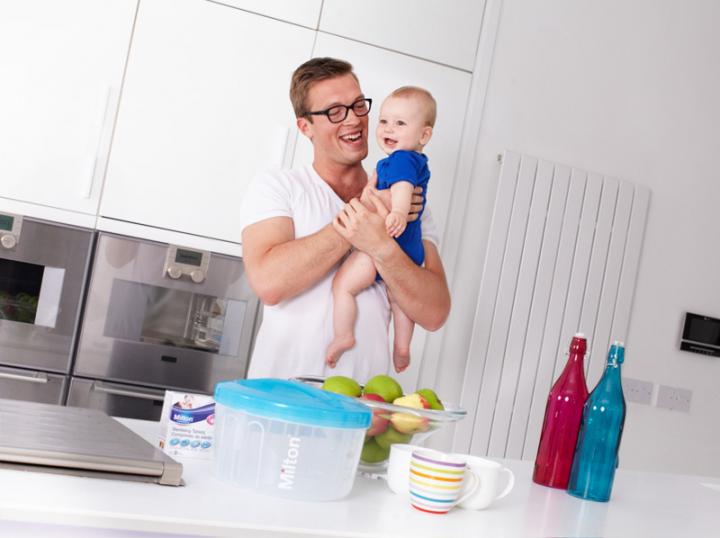Advice to protect baby
Advice to protect your baby

Whether you choose to breast or bottle feed your baby, you will need to start a hygiene routine from the day they are born - and that means sterilising everything that goes into their mouth.
Milk is not just an ideal food for baby - unfortunately it's also one of the best environments for bacteria to grow, so you need to take special care to make sure that germs are not introduced to your baby during feeds.
The number one rule to protect your baby and your family from germs is to wash your hands regularly and thoroughly. This is the best way to avoid germs being transmitted from you to your baby, as a high majority of germs are transmitted via hands. Encourage all other members of the family and visitors to wash their hands regularly, especially before touching your baby. This should be a priority for everyone.
Wash your hands:
- After going to the toilet
- Before preparing food
- Before eating
- Before and after changing your baby
- Before feeding your baby
- Before touching baby feeding utensils
- Before using breastfeeding equipment
- If you are ill (cold, flu, gastroenteritis)
- After playing with pets
- After gardening
If you have chosen to breastfeed your baby, you may need to express your milk with a breast-pump and store your milk using milk containers or bags. You may also use some breast shields during breastfeeding.
Milk is an ideal environment for bacteria to grow and milk residue can accumulate on your equipment.
To avoid this, you must thoroughly wash all breastfeeding equipment and milk storage containers, then you must sterilise everything.
Dismantle breastpumps, wash them well after use, then you can submerge all non-metallic parts in a Milton Sterilising Solution. If the breastpump includes any plastic connection tubing, this should also be sterilised along with the funnel.
Never put expressed milk into anything that has not been sterilised. If you use milk containers always sterilise them first including the screw top before filling them with freshly expressed milk. Write the date and time on each bottle then transfer immediately to the fridge or the freezer.
You can store breast milk in a sterilised container:
- In the fridge for up to five days at 4°C or lower
- For two weeks in the ice compartment of a fridge
- For up to six months in a freezer
If you have frozen your milk, defrost it in the fridge before giving it to your baby. Once it is defrosted, you must use it straight away. Never re-freeze milk once it is thawed.
If you have chosen to bottle feed your baby, you must thoroughly wash and sterilise all the baby bottle components before and after each use.
Ensure that all milk residues are removed from bottles and teats before you sterilise, otherwise the bottles won’t be fully sterile and bacteria could remain in the teat. Remember that milk is the ideal environment for bacteria to grow which is why special care must be taken when washing baby bottles.
Once you have sterilised baby bottles, don’t leave them out for long periods of time on work surfaces before using them. As they stay out, bacteria will slowly contaminate them again. You can either leave them in a Milton Sterilising Solution, or in a closed Milton Combi Steriliser for 24 hours, or in your fridge (with the lid and teat on) at a minimum of 4°C temperature.
Tip: when you purchase your feeding equipment, try to select a shape of baby bottles that looks simple and easy to clean.
Because infant formula can sometimes contain bacteria, it is important to make up each feed as your baby needs it, using boiled water (temperature 70°C or above). The hot water will ensure that any harmful bacteria get killed. Always remember to let the feed cool before giving it to baby.
Do not keep the feed in the fridge because bacteria can still survive and multiply. Always throw away any unused formula or breast milk after the feed.
To protect your baby from germs, it is important to ensure that you clean and disinfect your home regularly. Babies tend to touch and put everything in their mouth, and their mouths may even come into contact with the floor.
Whether you are only going away for the weekend or you are planning a holiday abroad, travelling with a little baby is not always easy. Plan well ahead for everything that you will need to bring along for your baby.
When travelling, take with you some Milton Sterilising Tablets and the Milton Solo Travel Steriliser. They are ideal to pop in your bag and don’t take up much space. They will allow you to sterilise all baby’s feeding equipment during your stay.
When you are outside your home, you will be faced with many areas which may not be very clean. Take with you some cleaning and disinfecting wipes to clean the hot spots in public places which may not be very clean, such as public toilets, baby changing facilities and high chairs.
